List of National Historic Landmarks in New York
This is a list of National Historic Landmarks and comparable other historic sites designated by the U.S. government in the U.S. state of New York. The United States National Historic Landmark (NHL) program operates under the auspices of the National Park Service, and recognizes buildings, structures, objects, sites and districts of resources according to a list of criteria of national significance.[1] There are 276 NHLs in New York state, which is more than 10 percent of all the NHLs nationwide, and the most of any state.[2] The National Park Service also has listed 20 National Monuments, National Historic Sites, National Memorials, and other sites as being historic landmarks of national importance,[3] of which 7 are also designated NHLs. All of these historic landmarks are covered in this list.
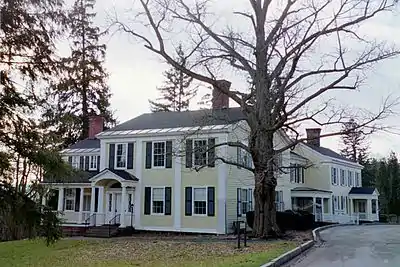
There are 139 NHLs in upstate New York, 13 on Long Island, and 116 within New York City (NYC). Three counties have ten or more NHLs: New York County (Manhattan) has 86; Westchester County, just north of NYC, has 18; and Erie County in western New York has 10. Twelve other counties have five to nine NHLs, eight have three or four, 27 counties have one or two, and the remaining twelve of the state's 62 counties have none. The first New York NHLs were eight designated on October 9, 1960; the latest was designated on January 13, 2021. The NHLs and other landmarks outside NYC are listed below; the NHLs in NYC are in this companion article.
Seven NHL sites are among the 20 National Park System historic areas in New York state.[4] The other 13 National Park Service areas are also historic landmark sites of national importance, but are already protected by Federal ownership and administration, so NHL designation is unnecessary. A list of these National Park Service areas that conserve historic sites in New York State is also provided. Finally, three former NHLs in the state are also listed.
Overview
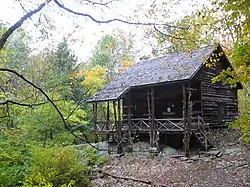
New York State NHLs include ten prehistoric or other archeological sites,[nb 1] 12 historical Dutch farmhouses, manors, and historic districts,[nb 2] and 21 architecturally and/or historically important churches or houses of worship.[nb 3] Fully 26 NHLs are primarily military, including 13 fort sites (five standing forts, three fortified houses, and five ruins),[nb 4] five other battlegrounds,[nb 5] seven military headquarters, training facilities, arsenals and armories,[nb 6] and one military shipwreck site.[nb 7] One of these NHLs is associated with the American Civil War,[nb 8] while all the rest of these forts and other military places are associated with the French and Indian War and/or the American Revolutionary War.
There are nine NHL ships, including a warship and a tugboat that served in World War II, one warship that saw combat in the Vietnam War, three sailing boats, two fireboats and a lightvessel.[nb 9] Salient in the list are 24 mansions,[nb 10] and four sites primarily significant for their architectural landscaping.[nb 11] Many properties, numbering in the thousands, are contributing or non-contributing structures in the state's nine National Historic Landmark Districts.[nb 12] Intellectual accomplishments of New Yorkers are associated with 22 sites, including nine university buildings,[nb 13] ten other NHLs associated with inventions, inventors or scientists,[nb 14] and four engineering landmarks, including two bridges that were once the longest of their types.[nb 15] Commercial accomplishments include 11 historic skyscrapers, five of which were once the tallest in the world,[nb 16] seven stock exchanges and other buildings important in commercial history,[nb 17] two bank buildings,[nb 18] five industrial facilities,[nb 19] and three water-based civil engineering works.[nb 20] Two are architectural oddities.[nb 21]

Political and social accomplishments are represented by four former mental care institutions (a legacy of the state's leading role in mental health care),[nb 22] 14 sites associated with suffragettes or other women leaders,[nb 23] five Underground Railroad or other sites associated with abolitionists,[nb 24] six sites associated with African-American leaders,[nb 25] three sites associated with labor rights,[nb 26] and four sites associated with other social activism.[nb 27] In addition, there are 21 homes of other national leaders,[nb 28] and six government buildings that are significant on a national scale.[nb 29] Community, arts and entertainment accomplishments represented include two utopian communes,[nb 30] the Adirondack Park and four of its Great Camps,[nb 31] and five other retreat sites.[nb 32] No fewer than nine artist homes or studios are landmarked,[nb 33] as well as nine homes of writers and composers.[nb 34] There are four club buildings, of which two are historical societies,[nb 35] and eight entertainment venues or sites associated with entertainers.[nb 36] Sixteen others are unique sites that are difficult to classify.[nb 37]

Notable architects whose work is represented in the NHLs of the state include: Alexander Jackson Davis (7 sites),[nb 38] Andrew Jackson Downing (2),[nb 39] William West Durant (2),[nb 40] Leopold Eidlitz (2),[nb 41] Cass Gilbert (2),[nb 42] Henry J. Hardenbergh (2),[nb 43] Raymond Hood (3),[nb 44] Philip Hooker (2),[nb 45] Minard Lafever (7),[nb 46] John McComb Jr. (3),[nb 47] Frederick Law Olmsted (3),[nb 48] Isaac G. Perry (2),[nb 49] George B. Post (3),[nb 50] James Renwick, Jr. (4),[nb 51] Henry Hobson Richardson (2),[nb 52] Louis Sullivan (2),[nb 53] Richard Upjohn (6),[nb 54] Calvert Vaux (6),[nb 55] and Frederick Clarke Withers (2).[nb 56] The firm McKim, Mead, and White participated in design of at least six buildings later declared to be NHLs.[nb 57] It was also that firm's work, Pennsylvania Station, whose pending demolition in 1963 launched a historic preservation movement in New York City and led to creation of the New York City Landmarks Preservation Commission in 1965.[5]
Current National Historic Landmarks outside New York City
The state of New York, exclusive of NYC, is home to 155 of these landmarks, which are tabulated here. Twenty-three of these are also State Historic Sites (SHS), and fourteen are National Park System areas; these designations are indicated in italics.
- Key
| National Historic Landmark | |
| † | National Historic Landmark District |
| ∞ | National Memorial |
| * | National Historic Site |
| National Monument | |
| National Historical Park | |
| Delisted landmark |
| [6] | Landmark name | Image | Date designated[7] | Location | County | Description |
|---|---|---|---|---|---|---|
| 1 | Adams Power Plant Transformer House |  Adams Power Plant Transformer House |
May 4, 1983 (#75001212) |
Niagara Falls 43°04′54″N 79°02′34″W |
Niagara | Transformer house of the first large-scale, alternating current electric generating plant in the world; tapped power of Niagara Falls via a 7,500 foot (2,286 m) tail-race tunnel |
| 2 | Adirondack Forest Preserve |  Adirondack Forest Preserve |
May 23, 1963 (#66000891) |
Northeastern Upstate New York 43°47′13″N 74°29′06″W |
All of Essex and Hamilton and parts of Clinton, Franklin, Fulton, Herkimer, Lewis, Oneida, St. Lawrence, Saratoga, Warren, and Washington | Largest publicly protected area in the lower 48 United States; largest National Historic Landmark; largest and one of earliest areas protected by any state; established in 1885; later protected in "forever wild" section of New York state constitution |
| 3 | Susan B. Anthony House |  Susan B. Anthony House |
May 23, 1965 (#66000528) |
Rochester 43°09′12″N 77°37′33″W |
Monroe | Home of Susan B. Anthony, prominent 19th century women's rights activist |
| 4 | Armour-Stiner House |  Armour-Stiner House |
December 8, 1976 (#75001238) |
Irvington 41°01′51″N 73°52′13″W |
Westchester | Octagonal implementation of architectural ideas of Orson Squire Fowler |
| 5 | Bennington Battlefield |  Bennington Battlefield |
January 20, 1961 (#66000564) |
Walloomsac 42°56′19″N 73°18′16″W |
Rensselaer | Site of Battle of Bennington, where the American defeat of a British foraging party of dragoons helped assure the Continental Army's pivotal victory at Saratoga |
| 6 | Boston Post Road Historic District |  Boston Post Road Historic District |
August 30, 1993 (#82001275) |
Rye 40°57′31″N 73°42′07″W |
Westchester | Three mansions and associated grounds with pre-contact archaeological significance; 5 contributing properties include the 1838 Peter Augustus Jay House and surrounding Jay Property, childhood home of Founding Father John Jay, Lounsberry, Whitby Castle, the private Jay Cemetery, final resting place of John Jay and his descendants, and Marshlands Conservancy, a nature preserve running from Boston Post Road down to the Long Island Sound, an area essentially unchanged for 200 years |
| 7 | Boughton Hill (Gannagaro) |  Boughton Hill (Gannagaro) |
July 19, 1964 (#66000559) |
Victor 42°57′40″N 77°24′46″W |
Ontario | The site of a 17th-century Seneca village known as the Town of Peace and birthplace of the Iroquois Confederacy |
| 8 | Bronck House | 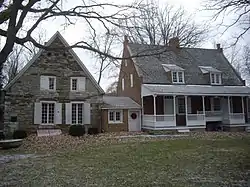 Bronck House |
December 24, 1967 (#67000012) |
Coxsackie 42°20′31″N 73°50′55″W |
Greene | Oldest structure in upstate New York; excellent example of Dutch colonial architecture |
| 9 | Dr. Oliver Bronson House and Estate |  Dr. Oliver Bronson House and Estate |
July 31, 2003 (#03001035) |
Hudson 42°14′35″N 73°47′09″W |
Columbia | Early example of the Hudson River bracketed style of Alexander Jackson Davis |
| 10 | John Brown Farm and Gravesite |  John Brown Farm and Gravesite |
August 5, 1998 (#72000840) |
Lake Placid 44°15′20″N 73°58′15″W |
Essex | Home and final resting place of famous abolitionist John Brown, executed for his raid on Harper's Ferry Armory before the Civil War |
| 11 | Buffalo and Erie County Historic Society Building |  Buffalo and Erie County Historic Society Building |
February 27, 1987 (#80002606) |
Buffalo 42°56′08″N 78°52′36″W |
Erie | Parthenon-evoking legacy of the 1901 Pan-American Exposition; turned over to historical society afterwards |
| 12 | Buffalo State Hospital |  Buffalo State Hospital |
June 24, 1986 (#86003557) |
Buffalo 42°55′46″N 78°52′56″W |
Erie | Architect H. H. Richardson's largest commission; advent of his characteristic Richardsonian Romanesque style; used to care for the mentally ill; grounds designed by Frederick Law Olmsted |
| 13 | John Burroughs' Riverby Study |  John Burroughs' Riverby Study |
October 18, 1968 (#68000035) |
West Park 41°48′00″N 73°57′32″W |
Ulster | Small frame structure built in 1881 by naturalist John Burroughs as a writing retreat; in this study, that looks east over the Hudson River, Burroughs wrote Fresh Fields (1884), Signs and Seasons (1886), Indoor Studies (1889), and Riverby (1894)[8] |
| 14 | Camp Pine Knot |  Camp Pine Knot |
August 18, 2004 (#86002934) |
Raquette Lake 43°49′17″N 74°37′34″W |
Hamilton | First of the Adirondack Great Camps; designed and built by William West Durant |
| 15 | Camp Uncas |  Camp Uncas |
October 6, 2008 (#86002937) |
Raquette Lake 43°44′38″N 74°38′53″W |
Hamilton | Second of the Adirondack Great Camps; designed and built by William West Durant |
| 16 | Canfield Casino and Congress Park |  Canfield Casino and Congress Park |
February 27, 1987 (#87000904) |
Saratoga Springs 43°04′45″N 73°46′58″W |
Saratoga | Former resort and casino; now houses the Saratoga Springs History Museum |
| 17 | Chautauqua Historic District |  Chautauqua Historic District |
June 29, 1989 (#73001168) |
Chautauqua 42°12′35″N 79°28′01″W |
Chautauqua | Adult education and summer retreat; focuses on programs related to arts, education, religion and recreation; well-preserved 19th century architecture |
| 18 | Christeen (sloop) |  Christeen (sloop) |
December 4, 1991 (#91002060) |
Oyster Bay 40°52′40″N 73°32′23″W |
Nassau | Oldest oyster sloop in the U.S. |
| 19 | Frederick E. Church House |  Frederick E. Church House |
June 22, 1965 (#66000509) |
Hudson 42°13′03″N 73°49′07″W |
Columbia | Calvert Vaux-designed home of Hudson River School painter Frederic Edwin Church; also known as Olana |
| 20 | Clermont | 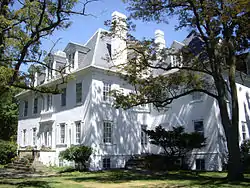 Clermont |
November 28, 1972 (#71000535) |
Clermont 42°05′09″N 73°55′09″W |
Columbia | Ancestral home of the Livingston family, prominent in colonial and early New York; known also as Clermont Manor |
| 21 | Cobblestone Historic District |  Cobblestone Historic District |
April 19, 1993 (#93001603) |
Gaines 43°17′16″N 78°10′54″W |
Orleans | Three buildings: a First Universalist Church, the Ward House, and schoolhouse exemplifying 19th-century U.S. cobblestone architecture at its highest |
| 22 | Thomas Cole House |  Thomas Cole House |
June 23, 1965 (#66000522) |
Catskill 42°13′35″N 73°51′43″W |
Greene | Home and studio of painter Thomas Cole, founder of the Hudson River School of American painting |
| 23 | Colonial Niagara Historic District |  Colonial Niagara Historic District |
October 9, 1960 (#66000556) |
Youngstown 43°15′42″N 79°03′49″W |
Niagara | Originally built by British during French and Indian War; served as US post in War of 1812 until retaken by British; ceded back at war's end |
| 24 | Columbia (Steamer) | 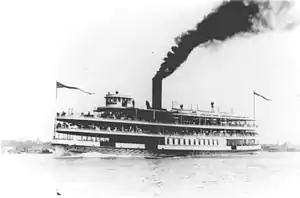 Columbia (Steamer) |
July 6, 1992 (#79001171) |
Buffalo 42°51′39″N 78°51′44″W |
Erie | This passenger steamship carried passengers to Bois Blanc Island for the Detroit & Windsor Ferry Company, and is one of the last remaining examples of her kind. Designed by Frank E. Kirby, noted naval architect.[9] In September 2015, it was moved to Buffalo, New York,[10] where it is being prepared for an eventual move to the Hudson River.[11] |
| 25 | Roscoe Conkling House |  Roscoe Conkling House |
May 15, 1975 (#75001214) |
Utica 43°05′46″N 75°13′47″W |
Oneida | Home of Roscoe Conkling, divisive U.S. senator in years after Civil War; leader of Stalwart faction of Republican Party; contributor to atmosphere that led to the assassination of James Garfield |
| 26 | Aaron Copland House |  Aaron Copland House |
October 6, 2008 (#03000245) |
Cortlandt Manor 41°14′24″N 73°54′09″W |
Westchester | Home of composer Aaron Copland for last 30 years of his life |
| 27 | Croton Aqueduct (Old) |  Croton Aqueduct (Old) |
April 27, 1992 (#74001324) |
Croton River to Manhattan 41°13′35″N 73°51′19″W |
Westchester | Large and complex water supply system for New York City; constructed between 1837 and 1842 |
| 28 | Davis-Ferris Organ |  Davis-Ferris Organ |
December 23, 2016 (#100000864) |
Round Lake 42°56′12″N 73°47′38″W |
Saratoga | Oldest three-manual organ in the nation. |
| 29 | De Wint House |  De Wint House |
May 23, 1966 (#66000568) |
Tappan 41°01′11″N 73°56′48″W |
Rockland | Oldest building in Rockland County; outstanding example of Dutch colonial architecture; used by George Washington as headquarters during final negotiations for British withdrawal from New York City |
| 30 | Delaware and Hudson Canal |  Delaware and Hudson Canal |
October 18, 1968 (#68000051) |
Kingston, NY, Rosendale, NY, Ellenville, NY, Port Jervis, NY, Lackawaxen, PA and Honesdale, PA 41°36′26″N 74°26′53″W |
Orange, NY, Sullivan, NY, Ulster, NY, Pike, PA and Wayne, PA | Vital coal supply line for New York City in 19th century; shared with Pennsylvania |
| 31 | John William Draper House |  John William Draper House |
May 15, 1975 (#75001237) |
Hastings-on-Hudson 40°59′24″N 73°52′48″W |
Westchester | Building mistakenly thought to be the home of scientist John William Draper; it was actually the home of his son, the astrophotography pioneer Henry Draper, the first person to photograph the Moon with recognizable surface features. |
| 32 | Dutch Reformed Church |  Dutch Reformed Church |
November 5, 1961 (#66000581) |
Sleepy Hollow 41°05′25″N 73°51′43″W |
Westchester | Oldest church building in state dates to 1685; figures prominently in Washington Irving's "The Legend of Sleepy Hollow" |
| 33 | Dutch Reformed Church, Newburgh |  Dutch Reformed Church, Newburgh |
August 7, 2001 (#70000425) |
Newburgh 41°30′16″N 74°00′32″W |
Orange | Church designed by Alexander Jackson Davis in 1835 in the Greek Revival style |
| 34 | Eagle Island Camp |  Eagle Island Camp |
August 18, 2004 (#86002941) |
Saranac Inn 44°16′28″N 74°19′57″W |
Franklin | One of the original Adirondack Great Camps, on Upper Saranac Lake; used as a Girl Scout camp today |
| 35 | Gardner Earl Memorial Chapel and Crematorium | 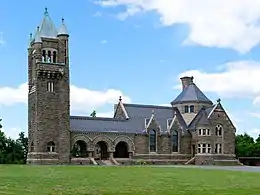 Gardner Earl Memorial Chapel and Crematorium |
March 2, 2012 (#04000091) |
Troy 42°45′20″N 73°40′17″W |
Rensselaer | Late 1880s Richardsonian Romanesque structure influenced design of many later memorial chapels. |
| 36 | George Eastman's house |  George Eastman's house |
November 13, 1966 (#66000529) |
Rochester 43°09′08″N 77°34′49″W |
Monroe | The home of George Eastman, founder of Kodak, now an internationally known photography museum |
| 37 | Edward M. Cotter | 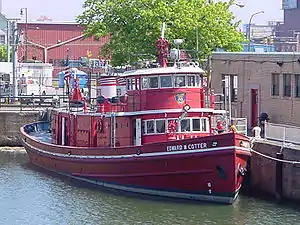 Edward M. Cotter |
June 28, 1996 (#96000968) |
Buffalo 42°52′20″N 78°52′22″W |
Erie | In use for 107 years; oldest active fireboat in the world |
| 38 | Elephant Hotel | 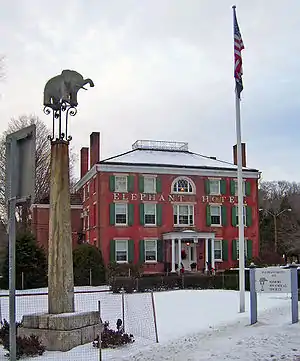 Elephant Hotel |
April 5, 2005 (#05000462) |
Somers 41°19′37″N 73°41′13″W |
Westchester | "Cradle of the American circus" when it was used as headquarters by Hachaliah Bailey in the 1830s; today serves as both a museum and Somers Town Hall |
| 39 | Erie Canal |  Erie Canal |
October 9, 1960 (#66000530) |
Glen and Florida 42°56′23″N 74°17′11″W |
Montgomery | Aqueduct for Erie Canal over Schoharie Creek |
| 40 | Millard Fillmore House |  Millard Fillmore House |
May 30, 1974 (#74001235) |
East Aurora 42°46′06″N 78°37′21″W |
Erie | Only surviving home of 13th U.S. President Millard Fillmore, besides the White House |
| 41 | Fire Fighter (fireboat) |  Fire Fighter (fireboat) |
June 30, 1989 (#89001447) |
Greenport 41°05′59″N 72°21′41″W |
Suffolk | Originally listed in New York City, since moved to Greenport |
| 42 | First Presbyterian Church (Old Whalers) |  First Presbyterian Church (Old Whalers) |
April 19, 1994 (#94001194) |
Sag Harbor 40°59′50″N 72°17′39″W |
Suffolk | Egyptian Revival style church |
| 43 | First Reformed Protestant Dutch Church of Kingston | 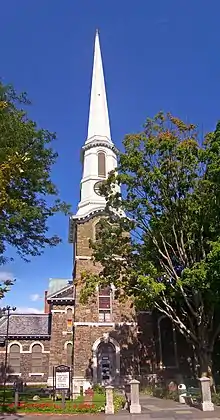 First Reformed Protestant Dutch Church of Kingston |
October 6, 2008 (#08001089) |
Kingston 41°55′58″N 74°01′08″W |
Ulster | 1850 "Old Dutch Church" is third home to congregation established in 1659. Nearby graves include George Clinton. One of the few Minard Lefever churches whose original steeple has survived. His only intact Renaissance Revival church, and his only known one in stone. |
| 44 | Gen. William Floyd House |  Gen. William Floyd House |
June 17, 1971 (#71000549) |
Westernville 43°18′22″N 75°23′02″W |
Oneida | Upstate home of William Floyd, a signer of the Declaration of Independence |
| 45 | Fort Corchaug Archeological Site |  Fort Corchaug Archeological Site |
January 20, 1999 (#74001308) |
Southold 41°00′10″N 72°29′55″W |
Suffolk | Site of a Native American fort |
| 46 | Fort Crailo | 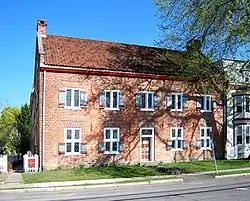 Fort Crailo |
November 5, 1961 (#66000563) |
Rensselaer 42°38′08″N 73°44′59″W |
Rensselaer | Dutch colonial patroonship house; may be place where "Yankee Doodle" was written |
| 47 | Fort Crown Point |  Fort Crown Point |
October 18, 1968 (#68000033) |
Crown Point 44°01′45″N 73°25′52″W |
Essex | Built by British to secure Lake Champlain against French in mid-18th century |
| 48 | Fort Johnson |  Fort Johnson |
November 28, 1972 (#72000858) |
Fort Johnson 42°57′26″N 74°14′30″W |
Montgomery | Home of Sir William Johnson, and later his son Sir John Johnson. |
| 49 | Fort Klock |  Fort Klock |
November 28, 1972 (#72000859) |
St. Johnsville 42°59′06″N 74°39′01″W |
Montgomery | Mid-18th century fortified stone homestead in the Mohawk River Valley |
| 50 | Fort Massapeag Archeological Site |  Fort Massapeag Archeological Site |
April 19, 1993 (#93000610) |
Massapequa 40°39′11″N 73°27′40″W |
Nassau | Archaeological site in town of Oyster Bay, New York |
| 51 | Fort Montgomery |  Fort Montgomery |
November 28, 1972 (#72000897) |
Highlands 41°19′26″N 73°59′13″W |
Orange | Built by Continental Army in an attempt to control Hudson River; later taken and destroyed by the British |
| 52 | Fort Orange Archeological Site |  Fort Orange Archeological Site |
November 4, 1993 (#93001620) |
Albany 42°38′41″N 73°45′01″W |
Albany | Archaeological site at first permanent Dutch settlement in New Netherland |
| 53 | Fort St. Frédéric |  Fort St. Frédéric |
October 9, 1960 (#66000517) |
Crown Point 44°01′49″N 73°25′34″W |
Essex | Mostly destroyed by French forces in French and Indian War; British built Fort Crown Point next to its ruins |
| 54 | Fort Stanwix | 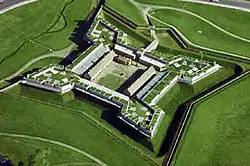 Fort Stanwix |
November 23, 1962 (#66000057) |
Rome 43°12′38″N 75°27′19″W |
Oneida | Modern reconstruction of colonial fort on original site |
| 55 | Fort Ticonderoga | Fort Ticonderoga |
October 9, 1960 (#66000519) |
Ticonderoga 43°50′29″N 73°23′17″W |
Essex | Site of important battles in both French and Indian War and American Revolution |
| 56 | General Electric Research Laboratory |  General Electric Research Laboratory |
May 15, 1975 (#75001227) |
Schenectady 42°48′39″N 73°57′06″W |
Schenectady | First industrial research facility in the U.S. |
| 57 | Geneseo Historic District |  Geneseo Historic District |
July 17, 1991 (#77000948) |
Geneseo 42°47′46″N 77°49′00″W |
Livingston | Well-preserved 19th century upstate village |
| 58 | Jay Gould Estate |  Jay Gould Estate |
November 13, 1966 (#66000582) |
Tarrytown 41°03′21″N 73°51′55″W |
Westchester | Alexander Jackson Davis-designed Gothic Revival mansion named Lyndhurst; became home to rail baron Jay Gould |
| 59 | Grant Cottage |  Grant Cottage |
January 13, 2021 (#100006247) |
CR 101 north of US 9 43°12′03″N 73°44′45″W |
Saratoga | Cottage first owned by banker Joseph W. Drexel. It was the site where Ulysses S. Grant died in 1885. |
| 60 | W. & L. E. Gurley Building |  W. & L. E. Gurley Building |
May 4, 1983 (#70000432) |
Troy 42°43′56″N 73°41′13″W |
Rensselaer | Classical Revival structure; built in 1862; housed the W. & L. E. Gurley Company, a maker of precision measuring instruments |
| 61 | James Hall Office |  James Hall Office |
December 8, 1976 (#76001204) |
Albany 42°38′45″N 73°46′09″W |
Albany | Office of paleontologist James Hall, a leader in research on the geology of North America during the 19th century; designed by Vaux and Olmsted |
| 62 | Harmony Mills | 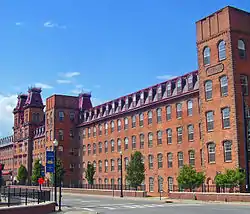 Harmony Mills |
January 20, 1999 (#78003151) |
Cohoes 42°46′53″N 73°42′16″W |
Albany | Largest cotton mill complex in the world when it opened in 1872; one of the finest examples of a large-scale textile mill complex outside New England |
| 63 | E.H. Harriman Estate |  E.H. Harriman Estate |
November 13, 1966 (#66000561) |
Harriman 41°17′48″N 74°07′09″W |
Orange | Estate of railroad magnate Edward Harriman; also known as Arden |
| 64 | John A. Hartford House |  John A. Hartford House |
December 22, 1977 (#77000987) |
Valhalla 41°04′07″N 73°47′26″W |
Westchester | Home of John Hartford, whose family built A&P into the first nationwide retail chain |
| 65 | Jean Hasbrouck House |  Jean Hasbrouck House |
December 24, 1967 (#67000016) |
New Paltz 41°45′03″N 74°05′19″W |
Ulster | Early eighteenth century example of Hudson Valley Dutch architecture; located within the Huguenot Street Historic District |
| 66 | Lemuel Haynes House |  Lemuel Haynes House |
May 15, 1975 (#75001235) |
South Granville 43°22′16″N 73°17′00″W |
Washington | Last home of Lemuel Haynes, first African-American preacher ordained in America. |
| 67 | Historic Track |  Historic Track |
May 23, 1966 (#66000560) |
Goshen 41°24′08″N 74°19′10″W |
Orange | Oldest continuously operated horse racing facility in U.S. |
| 68 | Holland Land Office |  Holland Land Office |
October 9, 1960 (#66000521) |
Batavia 42°59′55″N 78°11′21″W |
Genesee | Main office of Holland Land Company, early owners of Western New York. |
| 69 | Franklin B. Hough House |  Franklin B. Hough House |
May 23, 1963 (#66000526) |
Lowville 43°47′18″N 75°30′00″W |
Lewis | Home of Franklin Hough, considered the father of American forestry |
| 70 | Hudson River Historic District | 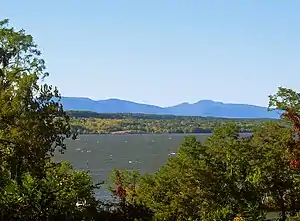 Hudson River Historic District |
December 14, 1990 (#90002219) |
East bank of river between Staatsburg and Germantown 41°55′13″N 73°56′12″W |
Dutchess and Columbia | View of Catskills across river from here inspired Hudson River School artists; small towns with much land use and architecture preserved from past eras |
| 71 | Hudson River State Hospital, Main Building |  Hudson River State Hospital, Main Building |
June 30, 1989 (#89001166) |
Poughkeepsie 41°43′59″N 73°55′41″W |
Dutchess | Frederick Clarke Withers-designed first institutional building in the U.S. in High Victorian Gothic style. Grounds designed by Frederick Law Olmsted and Calvert Vaux |
| 72 | Huguenot Street Historic District |  Huguenot Street Historic District |
October 9, 1960 (#66000578) |
New Paltz 41°45′00″N 74°05′21″W |
Ulster | One of the oldest continuously inhabited neighborhoods in the current United States of America (Taos Pueblo is another) |
| 73 | Hurley Historic District |  Hurley Historic District |
November 5, 1961 (#66000577) |
Hurley 41°55′32″N 74°03′49″W |
Ulster | Ten stone Dutch Colonial houses; served as the capitol of NY for two months during the American Revolution |
| 74 | Hyde Hall |  Hyde Hall |
June 24, 1986 (#71000555) |
Glimmerglass State Park 42°47′32″N 74°52′08″W |
Otsego | One of the finest American houses that combines the architectural traditions of England and America; one of the few surviving works of Philip Hooker. |
| 75 | John Jay Homestead |  John Jay Homestead |
May 29, 1981 (#72000918) |
Katonah 41°15′05″N 73°39′36″W |
Westchester | Home of John Jay, first Chief Justice of the United States |
| 76 | Johnson Hall |  Johnson Hall |
October 9, 1960 (#66000520) |
Johnstown 43°00′58″N 74°23′00″W |
Fulton | Later home of Sir William Johnson; Johnson Hall was seized by the rebel government during the American Revolution and was subsequently acquired by Silas Talbot. |
| 77 | Kleinhans Music Hall |  Kleinhans Music Hall |
June 30, 1989 (#89001235) |
Buffalo 42°54′07″N 78°53′01″W |
Erie | Home of the Buffalo Philharmonic Orchestra, designed by Eliel and Eero Saarinen. |
| 78 | Knox Headquarters |  Knox Headquarters |
November 28, 1972 (#72000901) |
Vails Gate 41°27′18″N 74°03′00″W |
Orange | Headquarters of Gen. Henry Knox during the American Revolution |
| 79 | Lake Mohonk Mountain House |  Lake Mohonk Mountain House |
June 24, 1986 (#73001280) |
New Paltz 41°46′07″N 74°09′20″W |
Ulster | Distinctive resort on Shawangunk Ridge; site of 1895-1916 conference that led to establishment of Permanent Court of Arbitration at The Hague |
| 80 | Lamoka | January 20, 1961 (#66000571) |
Tyrone Address Restricted |
Schuyler | First archeological evidence of an Archaic (c. 3,500 BCE) hunter-gatherer culture in the U.S. | |
| 81 | Land Tortoise (radeau) | August 5, 1998 (#95000819) |
Bottom of Lake George 43°25′16″N 73°42′30″W |
Warren | Only known surviving radeau (simple flat-bottomed ship with cannon), sunk under 100 feet (30 m) of water during French and Indian War | |
| 82 | Irving Langmuir House |  Irving Langmuir House |
January 7, 1976 (#76001275) |
Schenectady 42°48′58″N 73°55′09″W |
Schenectady | Home of physicist-chemist Irving Langmuir, winner of the 1932 Nobel Prize during his research career with General Electric |
| 83 | Lindenwald |  Lindenwald |
July 4, 1961 (#66000510) |
Kinderhook 42°22′11″N 73°42′15″W |
Columbia | Home of U.S. President Martin Van Buren; designed in part by Richard Upjohn |
| 84 | Manitoga (Russel Wright House and Studio) |  Manitoga (Russel Wright House and Studio) |
February 17, 2006 (#96001269) |
Garrison 41°20′55″N 73°57′04″W |
Putnam | House and studio of industrial designer Russel Wright. Designed by Wright and his wife to be sustainable and blend in with surrounding environment |
| 85 | Darwin D. Martin House | Darwin D. Martin House |
February 24, 1986 (#86000160) |
Buffalo 42°55′52″N 78°50′29″W |
Erie | Considered the most important building of architect Frank Lloyd Wright's early career. |
| 86 | Lewis Miller Cottage, Chautauqua Institution |  Lewis Miller Cottage, Chautauqua Institution |
December 21, 1965 (#66000506) |
Chautauqua 42°12′37″N 79°27′53″W |
Chautauqua | Home of Lewis Miller, founder of Chautauqua Institution, located on grounds |
| 87 | Edna St. Vincent Millay House (Steepletop) | 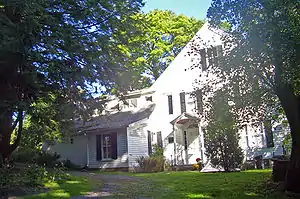 Edna St. Vincent Millay House (Steepletop) |
November 11, 1971 (#71000534) |
Austerlitz 42°19′13″N 73°26′52″W |
Columbia | Home of Pulitzer Prize-winning poet Edna St. Vincent Millay |
| 88 | Modesty (sloop) |  Modesty (sloop) |
August 7, 2001 (#01001051) |
West Sayville 40°43′22″N 73°05′43″W |
Suffolk | Example of a Long Island oyster dredging sloop, and only extant one that operated purely on sail power |
| 89 | Mohawk Upper Castle Historic District |  Mohawk Upper Castle Historic District |
November 4, 1993 (#93001621) |
Danube 43°00′10″N 74°46′40″W |
Herkimer | Historic district including the Indian Castle Church as well as archaeological site areas |
| 90 | Montauk Point Light |  Montauk Point Light |
March 2, 2012 (#69000142) |
East Hampton 41°04′15″N 71°51′26″W |
Suffolk | Built in 1797, oldest lighthouse in New York and fourth-oldest in country |
| 91 | Montgomery Place | 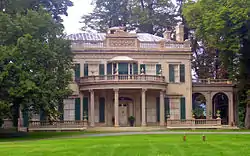 Montgomery Place |
April 8, 1992 (#75001184) |
Annandale 42°00′52″N 73°55′08″W |
Dutchess | Federal-style house, with expansion designed by architect Alexander Jackson Davis |
| 92 | Thomas Moran House |  Thomas Moran House |
December 21, 1965 (#66000574) |
East Hampton 40°57′14″N 72°11′40″W |
Suffolk | Home of the Hudson River School painter Thomas Moran who helped inspire the creation of the National Park system |
| 93 | Morrill Hall, Cornell University |  Morrill Hall, Cornell University |
December 21, 1965 (#66000576) |
Ithaca 42°26′55″N 76°29′08″W |
Tompkins | First building of Cornell University |
| 94 | Samuel F. B. Morse House |  Samuel F. B. Morse House |
January 29, 1964 (#66000515) |
Poughkeepsie 41°37′51″N 73°55′10″W |
Dutchess | Home of telegraph inventor Samuel F. B. Morse in his later years; preserved by subsequent owners |
| 95 | Mount Lebanon Shaker Society |  Mount Lebanon Shaker Society |
June 23, 1965 (#66000511) |
New Lebanon 42°27′09″N 73°22′50″W |
Columbia | Main Shaker community established in U.S. |
| 96 | William Sidney Mount House | 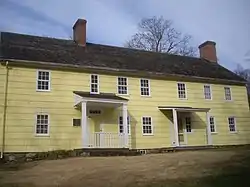 William Sidney Mount House |
December 21, 1965 (#66000575) |
Stony Brook 40°54′27″N 73°08′18″W |
Suffolk | Home and studio of painter William Sidney Mount |
| 97 | Kate Mullany House |  Kate Mullany House |
April 1, 1998 (#98000453) |
Troy 42°44′24″N 73°40′54″W |
Rensselaer | Home of Kate Mullany, early female labor organizer and founder of Collar Laundry Union |
| 98 | Nash (harbor tug) | 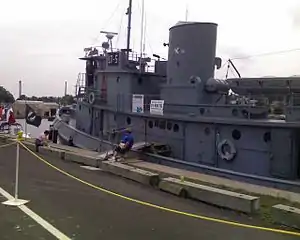 Nash (harbor tug) |
December 4, 1991 (#91002059) |
Oswego 43°27′49″N 76°30′56″W |
Oswego | Last surviving U.S. Army vessel that participated in World War II's D-Day Normandy landing |
| 99 | New York State Barge Canal |  New York State Barge Canal |
December 23, 2016 (#100000834) |
42°47′12″N 73°40′44″W |
Albany, Erie, Herkimer, Madison, Monroe, Montgomery, Niagara, Oneida, Onondaga, Orleans, Oswego, Rensselaer, Saratoga, Schenectady, Seneca, Washington, Wayne | |
| 100 | New York State Capitol |  New York State Capitol |
January 29, 1979 (#71000519) |
Albany 42°39′09″N 73°45′26″W |
Albany | Built in two different architectural styles; one of ten U.S. state capitol buildings without a dome |
| 101 | New York State Inebriate Asylum |  New York State Inebriate Asylum |
December 9, 1997 (#96000814) |
Binghamton 42°06′23″N 75°51′57″W |
Broome | First hospital built to treat alcoholism and view it as a medical problem rather than a character flaw |
| 102 | Newtown Battlefield |  Newtown Battlefield |
November 28, 1972 (#72000826) |
Elmira 42°02′43″N 76°44′00″W |
Chemung | Site of only major battle of the Sullivan Expedition, a decisive victory by General John Sullivan over of Loyalist-Indian forces led by Joseph Brant, in August 1779 |
| 103 | Niagara Reservation |  Niagara Reservation |
May 23, 1963 (#66000555) |
Niagara Falls 43°05′N 79°04′W |
Niagara | Oldest U.S. state park (1885); built around U.S. side of Niagara Falls |
| 104 | Nott Memorial Hall | 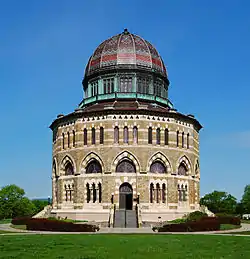 Nott Memorial Hall |
June 24, 1986 (#72000912) |
Schenectady 42°49′02″N 73°55′49″W |
Schenectady | Sixteen-sided building on Union College campus considered outstanding example of Victorian Gothic architecture |
| 105 | Old House |  Old House |
November 5, 1961 (#66000573) |
Cutchogue 41°00′30″N 72°29′08″W |
Suffolk | Built in 1649; asserted to be "one of the finest surviving examples of English domestic architecture in America" |
| 106 | Old Main, Vassar College |  Old Main, Vassar College |
June 24, 1986 (#73001183) |
Poughkeepsie 41°41′12″N 73°53′45″W |
Dutchess | Second Empire building was the second building of one of America's first women's colleges |
| 107 | Oneida Community Mansion House | 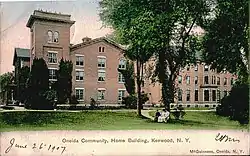 Oneida Community Mansion House |
June 23, 1965 (#66000527) |
Oneida 43°03′37″N 75°36′19″W |
Madison | Built in 1848 for the Oneida Community |
| 108 | Oriskany Battlefield |  Oriskany Battlefield |
November 23, 1962 (#66000558) |
Oriskany 43°10′38″N 75°22′10″W |
Oneida | Local militias held off pro-British Indians and Loyalists in Battle of Oriskany, one of the few battles of the Revolutionary War in which all participants were natives of North America |
| 109 | Owl's Nest |  Owl's Nest |
November 11, 1971 (#71000565) |
Lake George 43°26′41″N 73°39′18″W |
Warren | Home of author Edward Eggleston, one of America's first realist novelists |
| 110 | Thomas Paine Cottage |  Thomas Paine Cottage |
November 28, 1972 (#72000920) |
New Rochelle 40°56′11″N 73°47′12″W |
Westchester | Home and gravesite of Thomas Paine, author of Common Sense |
| 111 | Palisades Interstate Park |  Palisades Interstate Park |
January 12, 1965 (#66000890) |
Hudson River western shoreline; shared with New Jersey 40°57′11″N 73°55′52″W |
Rockland, NY, Orange County, NY, and Bergen, NJ | Joint effort by two states to preserve scenic beauty of west Hudson Palisades and protect them from development and quarrying |
| 112 | Petrified Sea Gardens |  Petrified Sea Gardens |
January 20, 1999 (#99000631) |
Saratoga Springs 43°04′59″N 73°50′40″W |
Saratoga | First stromatolites in North America discovered here; fossils of marine algae were fully described by pioneering female paleontologist Winifred Goldring |
| 113 | Philipsburg Manor House |  Philipsburg Manor House |
November 5, 1961 (#66000584) |
Sleepy Hollow 41°05′26″N 73°51′55″W |
Westchester | Historic house, water mill, and trading site; at one time, one of the largest slave holdings in the colonial North |
| 114 | Philipse Manor Hall |  Philipse Manor Hall |
November 5, 1961 (#66000585) |
Yonkers 40°56′08″N 73°53′59″W |
Westchester | Historic house museum; Westchester County's oldest standing building |
| 115 | Plattsburgh Bay | 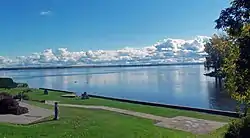 Plattsburgh Bay |
December 19, 1960 (#66000507) |
Lake Champlain 44°41′33″N 73°22′34″W |
Clinton | Site of Battle of Plattsburgh, where U.S. land and naval forces repulsed the last foreign invasion attempt on the northern states during the War of 1812 |
| 116 | Playland Amusement Park |  Playland Amusement Park |
February 27, 1987 (#80004529) |
Rye 40°57′57″N 73°40′26″W |
Westchester | The only publicly owned amusement park in the U.S.; rides and attractions were designed in the Art Deco style |
| 117 | Jackson Pollock House and Studio |  Jackson Pollock House and Studio |
April 19, 1994 (#94001193) |
East Hampton 41°01′26″N 72°09′18″W |
Suffolk | Home and studio of painter Jackson Pollock and his wife Lee Krasner beginning in 1945 |
| 118 | Priscilla (sloop) | 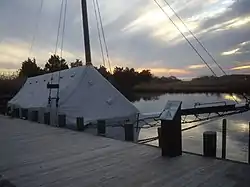 Priscilla (sloop) |
February 17, 2006 (#06000238) |
West Sayville 40°43′22″N 73°05′43″W |
Suffolk | Example of a classic Long Island oyster dredging sloop |
| 119 | Prudential (Guaranty) Building |  Prudential (Guaranty) Building |
May 15, 1975 (#73001187) |
Buffalo 42°52′58″N 78°52′36″W |
Erie | Early skyscraper design; collaboration between Louis Sullivan and Dankmar Adler |
| 120 | John D. Rockefeller Estate |  John D. Rockefeller Estate |
May 11, 1976 (#76001290) |
Pocantico Hills 41°05′23″N 73°50′40″W |
Westchester | Estate of the oil tycoons, the Rockefeller family; also known as Kykuit |
| 121 | Elihu Root House |  Elihu Root House |
November 28, 1972 (#72000893) |
Clinton 43°02′59″N 75°24′18″W |
Oneida | Home of Elihu Root, U.S. Senator, Secretary of War, Secretary of State, and recipient of the 1912 Nobel Peace Prize |
| 122 | Rose Hill |  Rose Hill |
June 24, 1986 (#73001269) |
Fayette 42°51′38″N 76°56′09″W |
Seneca | Large-scale Greek Revival house |
| 123 | Roycroft Campus |  Roycroft Campus |
February 24, 1986 (#74001236) |
East Aurora 42°46′04″N 78°37′04″W |
Erie | Elbert Hubbard-founded home of a key community in the Arts and crafts movement |
| 124 | Rudolph Oyster House | 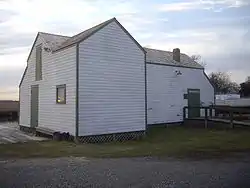 Rudolph Oyster House |
August 7, 2001 (#01001052) |
West Sayville 40°43′22″N 73°05′43″W |
Suffolk | Early 20th century seafood processing plant |
| 125 | Sagamore Camp |  Sagamore Camp |
May 16, 2000 (#76001221) |
Raquette Lake 43°45′56″N 74°37′38″W |
Hamilton | Designed by William West Durant; one of the most sophisticated and evolved examples of the Adirondack Great Camps |
| 126 | St. Paul's Cathedral |  St. Paul's Cathedral |
December 23, 1987 (#73002298) |
Buffalo 42°52′58″N 78°52′35″W |
Erie | Gothic Revival church designed by Richard Upjohn |
| 127 | St. Peter's Episcopal Church | 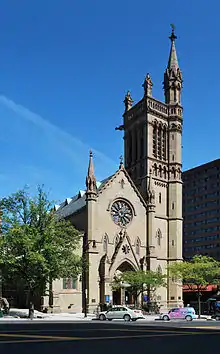 St. Peter's Episcopal Church |
January 16, 1980 (#72000817) |
Albany 42°39′03″N 73°45′16″W |
Albany | Gothic church by architect Richard Upjohn |
| 128 | Santanoni Preserve |  Santanoni Preserve |
May 16, 2000 (#86002955) |
Newcomb 44°00′41″N 74°07′44″W |
Essex | One of the earliest Adirondack Great Camps; a major influence on later ones |
| 129 | Saratoga Spa State Park |  Saratoga Spa State Park |
February 27, 1987 (#85002357) |
Saratoga Springs 43°03′04″N 73°48′14″W |
Saratoga | Site of only active geysers in Eastern U.S.; popular resort for wealthy in early 20th century |
| 130 | Schuyler Flatts Archeological District |  Schuyler Flatts Archeological District |
November 4, 1993 (#74001217) |
Colonie 42°42′23″N 73°42′29″W |
Albany | Archeological district with artifacts from 6,000 years of human habitation; now a local park. |
| 131 | Philip Schuyler Mansion | 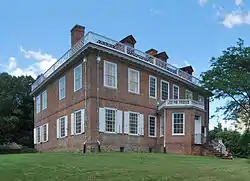 Philip Schuyler Mansion |
December 24, 1967 (#67000008) |
Albany 42°38′29″N 73°45′33″W |
Albany | Home of Philip Schuyler, general in the Continental Army and early U.S. Senator |
| 132 | William H. Seward House |  William H. Seward House |
January 29, 1964 (#66000504) |
Auburn 42°55′33″N 76°33′59″W |
Cayuga | Home for many years of William Henry Seward, statesman whose long career was capped by the purchase of Alaska as Secretary of State |
| 133 | Slabsides |  Slabsides |
November 24, 1968 (#68000034) |
West Park 41°47′40″N 73°58′23″W |
Ulster | Log cabin built by John Burroughs and son as nature retreat |
| 134 | USS Slater |  USS Slater |
March 2, 2012 (#98000393) |
Albany 42°38′33″N 73°44′59″W |
Albany | |
| 135 | Gerrit Smith Estate |  Gerrit Smith Estate |
January 30, 2001 (#97001386) |
Peterboro 42°58′04″N 75°41′14″W |
Madison | Home of Gerrit Smith, 19th century social reformer and presidential candidate |
| 136 | John Philip Sousa House |  John Philip Sousa House |
May 23, 1966 (#66000532) |
Port Washington 40°50′38″N 73°43′49″W |
Nassau | Home of legendary bandleader and composer John Philip Sousa |
| 137 | Springside |  Springside |
August 11, 1969 (#69000141) |
Poughkeepsie 41°41′21″N 73°55′43″W |
Dutchess | Only surviving landscape designed by Andrew Jackson Downing; also known as Matthew Vassar Estate |
| 138 | Elizabeth Cady Stanton House |  Elizabeth Cady Stanton House |
June 23, 1965 (#66000572) |
Seneca Falls 42°54′45″N 76°47′18″W |
Seneca | Home of 19th century feminist Elizabeth Cady Stanton |
| 139 | Stepping Stones (Bill and Lois Wilson House) | 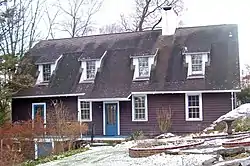 Stepping Stones (Bill and Lois Wilson House) |
October 16, 2012 (#04000705) |
Katonah 41°14′48″N 73°42′04″W |
Westchester | Home of Alcoholics Anonymous cofounder Bill W. and his wife Lois; he wrote The Big Book here and the table around which AA was founded is on exhibit. |
| 140 | Stony Point Battlefield |  Stony Point Battlefield |
January 20, 1961 (#66000567) |
Stony Point 41°14′29″N 73°58′25″W |
Rockland | Site of Anthony Wayne's victory over the British in the Battle of Stony Point |
| 141 | USS The Sullivans |  USS The Sullivans |
January 14, 1986 (#86000085) |
Buffalo 42°52′40″N 78°52′52″W |
Erie | Example of a Fletcher-class destroyer; saw service in World War II and Korea; now in the Buffalo and Erie County Naval & Military Park |
| 142 | Sunnyside |  Sunnyside |
December 29, 1962 (#66000583) |
Tarrytown 41°02′52″N 73°52′12″W |
Westchester | Estate of writer Washington Irving, best known for his short stories "The Legend of Sleepy Hollow" and "Rip Van Winkle" |
| 143 | Top Cottage |  Top Cottage |
December 9, 1997 (#97001679) |
Hyde Park 41°45′54″N 73°53′19″W |
Dutchess | Fieldstone cottage built as retreat for Franklin D. Roosevelt, with his input; one of the first American buildings designed to be fully wheelchair accessible |
| 144 | Troy Savings Bank |  Troy Savings Bank |
April 11, 1989 (#89001066) |
Troy 42°43′49″N 73°41′17″W |
Rensselaer | Designed by George B. Post to accommodate both a functioning bank on the first floor and an auditorium |
| 145 | Harriet Tubman Home for the Aged, Harriet Tubman Residence, Thompson A.M.E. Zion Church |  Harriet Tubman Home for the Aged, Harriet Tubman Residence, Thompson A.M.E. Zion Church |
May 30, 1974 (#74001222) |
Auburn 42°54′40″N 76°34′04″W |
Cayuga | Properties associated with Harriet Tubman, a conductor on the Underground Railroad |
| 146 | United States Military Academy |  United States Military Academy |
December 19, 1960 (#66000562) |
Highlands 41°23′32″N 73°57′27″W |
Orange | Commonly known as West Point; oldest continuously occupied military post in the nation and alma mater of many U.S. Army leaders |
| 147 | Utica State Hospital (Main Building) |  Utica State Hospital (Main Building) |
June 30, 1989 (#71000548) |
Utica 43°06′18″N 75°15′12″W |
Oneida | First hospital for the "insane poor"; archetypal Greek Revival building |
| 148 | Valcour Bay |  Valcour Bay |
January 1, 1961 (#66000508) |
Lake Champlain 44°37′04″N 73°25′57″W |
Clinton | Site of Battle of Valcour Island during the Revolutionary War |
| 149 | Van Alen House |  Van Alen House |
December 24, 1967 (#67000011) |
Kinderhook 42°22′52″N 73°41′29″W |
Columbia | Exemplary Dutch colonial farmhouse, built in 1737 and preserved largely intact |
| 150 | Van Cortlandt Manor |  Van Cortlandt Manor |
November 5, 1961 (#66000579) |
Croton-On-Hudson 41°11′30″N 73°52′35″W |
Westchester | Colonial manor house from early 18th century |
| 151 | Vassar College Observatory |  Vassar College Observatory |
July 17, 1991 (#91002051) |
Poughkeepsie 41°41′15″N 73°53′37″W |
Dutchess | Workplace and home of Maria Mitchell, important 19th century astronomer and pioneering woman in the science |
| 152 | Villa Lewaro |  Villa Lewaro |
May 11, 1976 (#76001289) |
Irvington 41°02′35″N 73°51′50″W |
Westchester | Home of Madam C.J. Walker, first known African-American millionaire |
| 153 | Washington's Headquarters |  Washington's Headquarters |
January 20, 1961 (#66000887) |
Newburgh 41°29′55″N 74°00′28″W |
Orange | Headquarters of Washington during the final years of the Revolutionary War; Dutch stone house; oldest building in Newburgh; first-ever property designated as a historic site by a U.S. state |
| 154 | Watervliet Arsenal | Watervliet Arsenal |
November 13, 1966 (#66000503) |
Watervliet 42°43′06″N 73°42′31″W |
Albany | Oldest arsenal in U.S. |
| 155 | Elkanah Watson House |  Elkanah Watson House |
July 19, 1964 (#66000518) |
Port Kent 44°31′30″N 73°24′21″W |
Essex | Home of Elkanah Watson, Revolutionary-era diplomat, founder of the county fair and early promoter of canals |
| 156 | West Point Foundry Archeological Site | January 13, 2021 (#100006260) |
Kemble Ave. 41°24′51″N 73°57′11″W |
Putnam | ||
| 157 | Willard Memorial Chapel-Welch Memorial Hall | 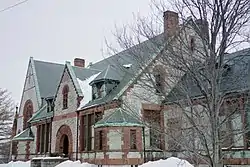 Willard Memorial Chapel-Welch Memorial Hall |
April 5, 2005 (#89000461) |
Auburn 42°56′14″N 76°33′48″W |
Cayuga | Last remaining Louis Comfort Tiffany stained glass installation in its original form |
| 158 | Jethro Wood House | 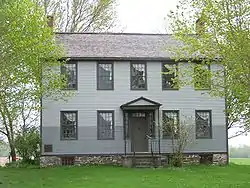 Jethro Wood House |
July 19, 1964 (#66000505) |
Poplar Ridge 42°44′15″N 76°37′56″W |
Cayuga | |
| 159 | Woodchuck Lodge |  Woodchuck Lodge |
December 29, 1962 (#66000512) |
Roxbury 42°17′47″N 74°35′01″W |
Delaware | |
| 160 | Yaddo | .jpg.webp) Yaddo |
February 27, 2013 (#13000282) |
Saratoga Springs 43°04′07″N 73°45′29″W |
Saratoga | Former estate now a prominent artists' colony and writers' retreat. |
Current NHLs in New York City
New York City alone is home to 114 NHLs. The earliest was one designated on October 9, 1960; the latest was designated on November 2, 2016. Many of the NHLs in NYC are also landmarked individually or as part of districts by the New York City Landmarks Preservation Commission. See List of New York City Designated Landmarks.
Historic areas in the United States National Park System
National Historic Sites, National Historic Parks, National Memorials, and certain other areas listed in the National Park system are historic landmarks of national importance that are highly protected already, often before the inauguration of the NHL program in 1960. There are 20 of these in New York State. The legislation establishing the National Historic Landmark program does not prevent these from being designated,[12] but in practice these are not often named NHLs per se, due to administrative costs of their nomination and to the low preservation value of designating them.[13]
For the first 16 years of the National Historic Landmarks program, the National Park Service did not consider any sites already within the National Park system for NHL designation, and in fact if a NHL-designated site came into the NPS system it was de-designated.[13]:94–95
In New York State, the William Floyd House within the Fire Island National Seashore and Ellis Island within the Statue of Liberty National Monument were both deemed NHL-eligible by the Advisory Board but were not designated.[13]:95
It was not until 1977 that a policy was promulgated that would allow for designation of National Historic Landmark "whose primary significance is not related to its park's purpose".[13]:96 The Jacob Riis House in Queens was de-designated in 1973.[13]:105
The National Park Service identifies 18 historic sites within national park units in New York State, and lists these together with the NHLs in the state,[3] and there are also two National Historic Sites that are "affiliated areas," receiving National Park Service support but not directly administered by it.[nb 58] Seven of the 20 were declared National Historic Landmarks, in several instances before receiving the higher protection designation, and retain their NHL standing. Four of these are listed above and three are included within the New York City list of NHLs. The 13 others are:
| Landmark name |
Image | Date established[14][15] | Location | County | Description | |
|---|---|---|---|---|---|---|
| 1 | Castle Clinton National Monument |  |
August 12, 1946 | New York | New York | Circular sandstone fort in Battery Park at the southern tip of Manhattan, New York City |
| 2 | Statue of Liberty National Monument |  |
October 15, 1924 | Liberty Island | New York | Monument presented to the United States by the people of France in 1886 |
| 3 | Saratoga National Historical Park |  |
June 1, 1938 | Stillwater, Schuylerville and Victory | Saratoga | Site of the 1777 Battle of Saratoga, the first significant American military victory of the American Revolutionary War |
| 4 | Women's Rights National Historical Park |  |
December 8, 1980 | Seneca Falls and Waterloo | Seneca | Established in 1980 in Seneca Falls and nearby Waterloo, New York; includes the Wesleyan Chapel, site of the Seneca Falls Convention and the Elizabeth Cady Stanton House |
| 5 | Eleanor Roosevelt National Historic Site |  |
May 27, 1977 | Hyde Park | Dutchess | Property developed by Eleanor Roosevelt; place that she could develop some of her ideas for work with winter jobs for rural workers and women; includes a large two-story stuccoed building that housed Val-Kill Industries; would become Eleanor's home after Franklin's death |
| 6 | Home of Franklin D. Roosevelt National Historic Site |  |
January 15, 1944 | Hyde Park | Dutchess | Birthplace, lifelong home, and burial place of the 32nd President of the United States, Franklin Delano Roosevelt |
| 7 | Sagamore Hill National Historic Site |  |
July 25, 1962 | Cove Neck | Nassau | Home of the 26th President of the United States Theodore Roosevelt from 1886 until his death in 1919 |
| 8 | Saint Paul's Church National Historic Site |  |
July 5, 1943 | Mount Vernon | Westchester | Colonial church used as a military hospital during the American Revolutionary War |
| 9 | Theodore Roosevelt Birthplace National Historic Site |  |
July 25, 1962 | New York | New York | Theodore Roosevelt born on this site on October 27, 1858 |
| 10 | Theodore Roosevelt Inaugural National Historic Site |  |
November 2, 1966 | Buffalo | Erie | Site of Theodore Roosevelt's oath of office as President of the United States on September 14, 1901 |
| 11 | Vanderbilt Mansion National Historic Site |  |
December 18, 1940 | Hyde Park | Dutchess | Includes pleasure grounds with views of the Hudson River and Catskill Mountains, formal gardens, natural woodlands, and numerous support structures as well as a 54-room mansion; completed in 1898; perfect example of the Beaux-Arts architecture style |
| 12 | Federal Hall National Memorial |  |
May 26, 1939 | New York | New York | First capitol of the United States of America; site of George Washington's first inauguration in 1789; place where the United States Bill of Rights passed; original building was demolished in the nineteenth century; replaced by the current structure, that served as the first United States Customs House |
| 13 | General Grant National Memorial |  |
April 27, 1897 | New York | New York | Mausoleum containing the bodies of Ulysses S. Grant (1822–1885), an American Civil War General and the 18th President of the United States, and his wife, Julia Dent Grant (1826–1902) |
There are four other National Park Service areas in New York State that do not have historic standing.[nb 59]
NHLs formerly located in New York
The following Landmarks were located in New York at the time they were declared National Historic Landmarks, but have since moved to other states.
| Landmark name [2] |
Image | Date of designation[2] | Location | Description[16] | |
|---|---|---|---|---|---|
| 1 | USS Edson (DD-946) | .jpg.webp) |
June 21, 1990 | Michigan | One of two surviving Forrest Sherman-class destroyers; saw action from World War II to Vietnam; In NYC from 1989 to 2004; relocated to Michigan in 2013. |
| 2 | Fir (Coast Guard cutter) |  |
April 27, 1992 | California | Lighthouse tender that served on west coast; last working vessel in the fleet of the United States Lighthouse Service, ancestors of today's United States Coast Guard buoy tenders; was intended at the time of NHL designation to become a museum ship in New York, but it is unclear if the ship was ever visited; transferred to Sacramento, California in 2002. |
| 3 | Nantucket (lightship) |  |
December 20, 1989 | Massachusetts |
Largest lightship ever built. Originally listed while she was primarily in Maine; sojourned for several years in Oyster Bay, New York. Arrived in Boston May 11, 2010. |
Former NHLs in New York
| Landmark name [2] |
Image | Date of designation[2] | Location | County | Description[16] | |
|---|---|---|---|---|---|---|
| 1 | Edwin H. Armstrong House |   |
January 7, 1976 | Yonkers | Westchester | Home of scientist and FM radio inventor Edwin H. Armstrong; demolished in 1983 and subsequently de-designated |
| 2 | Old Blenheim Bridge | January 29, 1964 | North Blenheim 42.472531°N 74.44127°W |
Schoharie | Longest single span covered bridge in Eastern United States; one of the longest in the world, until destruction during floods after Hurricane Irene in 2011. Designation withdrawn July 21, 2015 |
See also
Notes
- The nine archeological sites are: Boston Post Road Historic District, location of an 8000-year-old Paleo-Indian Archaeological site, Ganondagan State Historic Site, Fort Corchaug Archeological Site, Fort Massapeag Archeological Site, Fort Orange Archeological Site, Lamoka Site, Mohawk Upper Castle Historic District, Schuyler Flatts, and two in NYC: (African Burial Ground, and Wards Point Archeological Site).
- The twelve Dutch home sites are: Bronck House, De Wint House, Fort Crailo, Jean Hasbrouck House, Huguenot Street Historic District, Hurley Historic District, Philipsburg Manor House, Van Alen House, and four in NYC (Conference House, Voorlezer's House, Wyckoff-Bennett Homestead, and Wyckoff House).
- The twenty-one churches or houses of worship are: one of the three buildings in Cobblestone Historic District, Dutch Reformed Church (Newburgh, New York), Dutch Reformed Church (Sleepy Hollow), First Presbyterian Church (Sag Harbor, New York), First Reformed Protestant Dutch Church of Kingston, Harriet Tubman's Thompson AME Zion Church, the Indian Castle Church in Mohawk Upper Castle Historic District, St. Paul's Cathedral (Buffalo), St. Peter's Episcopal Church (Albany, New York), Willard Memorial Chapel-Welch Memorial Hall and 11 in NYC (Central Synagogue, Church of the Ascension, Eldridge Street Synagogue, Grace Church, New York, Old Quaker Meeting House (Flushing, Queens), Plymouth Church of the Pilgrims, St. Ann and the Holy Trinity Church, Trinity Church, St. George's Episcopal Church, St. Patrick's Cathedral, and St. Paul's Chapel).
- The thirteen fort sites include five standing forts: Fort Crown Point, Fort Montgomery (Hudson River), Fort Niagara, Fort Stanwix, and Fort Ticonderoga; three fortified houses: Fort Crailo, Fort Klock, and Fort Johnson; and six ruins: Fort Corchaug Archeological Site, Fort Massapeag Archeological Site, Mohawk Upper Castle Historic District, Fort Orange Archeological Site, and Fort St. Frédéric.
- The five other battlegrounds are: Bennington Battlefield, Newtown Battlefield, Oriskany Battlefield, Plattsburgh Bay, and Stony Point Battlefield.
- The seven military support sites are: Washington's Headquarters, Knox's Headquarters, United States Military Academy, Watervliet Arsenal, and three in NYC (69th Regiment Armory, Quarters A, Brooklyn Navy Yard, and the Seventh Regiment Armory).
- The shipwreck site is Land Tortoise (shipwreck).
- The military site associated with the Civil War is Watervliet Arsenal.
- The ten ships are: Edward M. Cotter (fireboat), Modesty (sloop), Nash (tugboat), Priscilla (sloop), USS The Sullivans (DD-537), and five in NYC (Ambrose (lightship), Firefighter (fireboat), USS Intrepid, and Lettie G. Howard (schooner)).
- The 24 mansions include 17 in the Hudson River valley or otherwise outside NYC: Boston Post Road Historic District, including the 1838 Peter Augustus Jay House, Clermont, Jay Gould Estate, E.H. Harriman Estate, John Hartford House, Hyde Hall, Lindenwald, Philipse Manor Hall, John D. Rockefeller Estate, Rose Hill (Fayette), Dr. Oliver Bronson House and Estate, Montgomery Place, Elkanah Watson House, Philip Schuyler Mansion, Sunnyside, Villa Lewaro, and Samuel F. B. Morse House, and seven in NYC: (Bartow-Pell Mansion, Carnegie Mansion, Pierpont Morgan Library, King Manor, Harry F. Sinclair House, Morris-Jumel Mansion, and Van Cortlandt House).
- The four landscaped sites are Springside (Matthew Vassar Estate) and three in NYC: (Central Park, Green-Wood Cemetery, and New York Botanical Garden).
- The nine historic districts are: Boston Post Road Historic District, Chautauqua Historic District, Cobblestone Historic District, Geneseo Historic District, Hudson River Historic District, Huguenot Street Historic District, Hurley Historic District, and two in NYC: Brooklyn Heights Historic District and SoHo-Cast Iron Historic District.
- The nine university buildings are: Morrill Hall, Main Building (Vassar College), Vassar College Observatory, Nott Memorial Hall, Elihu Root House, and four in NYC: (Low Memorial Library, Philosophy Hall, Pupin Hall, and Founder's Hall, The Rockefeller University).
- The ten inventions and scientists NHLs are: General Electric Research Laboratory, W. & L. E. Gurley Building, James Hall Office, John William Draper House, George Eastman House, Irving Langmuir House, Franklin Hough House, Samuel F. B. Morse House, Jethro Wood House, and one in NYC: (Bell Laboratories Building).
- The four engineering landmarks are: Old Blenheim Bridge, Adams Power Plant Transformer House, and two in NYC: (Brooklyn Bridge and Holland Tunnel).
- The eleven skyscrapers include five that were once the tallest in the world, all in NYC: Flatiron Building, Metropolitan Life Insurance Company Tower, Woolworth Building, Chrysler Building, and Empire State Building, and six others: Prudential Building in Buffalo and five in NYC (Bayard-Condict Building, Daily News Building, Equitable Building, McGraw-Hill Building, and New York Life Building).
- The seven commercial buildings, all in NYC, are: A. T. Stewart Company Store, American Stock Exchange Building, New York Stock Exchange Building, R. H. Macy and Company Store, New York Cotton Exchange, Chamber of Commerce Building, and Tiffany and Company Building.
- The two bank buildings are: Troy Savings Bank and New York City's National City Bank Building.
- The five industrial facilities are: Adams Power Plant Transformer House, Harmony Mills, W. & L. E. Gurley Building, Rudolph Oyster House, and one in NYC (Lorillard Snuff Mill).
- The three water works are: Croton Aqueduct (Old), Erie Canal National Historic Landmark, and Delaware and Hudson Canal.
- The two architectural oddities are Armour-Stiner House and Nott Memorial Hall.
- The four mental care institutions are: Utica State Hospital, Buffalo State Hospital, Hudson River State Hospital, and New York State Inebriate Asylum.
- The fourteen sites associated with women leaders are: Susan B. Anthony House, Kate Mullany House, Petrified Sea Gardens, Elizabeth Cady Stanton House, Steepletop, Harriet Tubman House, Villa Lewaro, Vassar College Observatory, and six in NYC (Alice Austen House, Florence Mills House, Henry Street Settlement, Morris-Jumel Mansion, New York Studio School (building), and Margaret Sanger Clinic).
- The six abolitionist sites are: Boston Post Road Historic District, site of the Jay Property and John Jay's boyhood home, John Brown Farm and Gravesite, Lemuel Haynes House, Gerrit Smith Estate, Harriet Tubman House, and one in NYC (Plymouth Church of the Pilgrims).
- The six sites later associated with African-American leaders are: Villa Lewaro and five in NYC (Matthew Henson Residence, James Weldon Johnson Residence, Florence Mills House, New York Amsterdam News Building, and Paul Robeson Home).
- The three labor rights associated sites are: Kate Mullany House, and two in NYC (Triangle Shirtwaist Factory and Union Square)
- The four other social activism sites in NYC are: Lower East Side Tenement National Historic Site, Henry Street Settlement, Margaret Sanger Clinic, and Stonewall.
- The twenty-two homes of other national leaders are: Roscoe Conkling House, Millard Fillmore House, Gen. William Floyd House, John Jay Homestead, Boston Post Road Historic District which includes the childhood home of Founding Father John Jay as well as his final resting place Johnson Hall, Lindenwald, Thomas Paine Cottage, Elihu Root House, William Seward House, Gerrit Smith Estate, Top Cottage, Elkanah Watson House, and seven in NYC (Chester A. Arthur House, Ralph Johnson Bunche House, Hamilton Grange National Memorial, King Manor, Alfred E. Smith House, Gen. Winfield Scott House, and Samuel J. Tilden House).
- The six government building are: New York State Capitol and five in NYC (New York City Hall, New York Surrogate's Court, Third Judicial District Courthouse, Tweed Courthouse, and the Alexander Hamilton U.S. Custom House).
- The two utopian communes are Mount Lebanon Shaker Society and Oneida Community Mansion House.
- The Adirondack Park's four great camps are: Camp Pine Knot, Eagle Island Camp, Sagamore Camp, and Santanoni Preserve.
- The five other retreats are: Lewis Miller Cottage, Chautauqua Institution, Chautauqua Historic District, Lake Mohonk Mountain House, Saratoga Spa State Park, and Canfield Casino and Congress Park.
- The nine artist studios are: Frederic E. Church House, Thomas Cole House, Roycroft Campus, Manitoga (Russel Wright Home), Thomas Moran House, William Sidney Mount House, Jackson Pollock House and Studio, and two in NYC (New York Studio School and Alice Austen House).
- The nine writer/composer sites are: three associated with John Burroughs (Slabsides, Woodchuck Lodge, and John Burroughs' Riverby Study), Edgar Eggleston's Owl's Nest, Edna St. Vincent Millay's Steepletop, Washington Irving's Sunnyside, and four in NYC (Will Marion Cook House, Duke Ellington House, Claude McKay Residence, and John Philip Sousa House).
- The four clubs are: Buffalo and Erie County Historical Society Building, and three in NYC (Brooklyn Historical Society Building, New York Yacht Club, and Players Club).
- The eight entertainment venues or entertainers are: Canfield Casino and Congress Park, Elephant Hotel, Historic Track, Kleinhans Music Hall, Playland Amusement Park, and three in NYC (Carnegie Hall, Florence Mills House, and Jackie Robinson House).
- The sixteen sites not elsewhere categorized are: Armour-Stiner House, Holland Land Office, Old House, Palisades Interstate Park, and 12 in NYC (Cooper Union, Dakota Apartments, Governors Island, Grand Central Station, Merchants House Museum, Metropolitan Museum of Art, New York Public Library Main Branch, Plaza Hotel, United Charities Building, Rockefeller Center, and Sailors' Snug Harbor).
- Architect Alexander Jackson Davis designed (or contributed to the design of) a mansion in the Boston Post Road Historic District, Dr. Oliver Bronson House and Estate, Dutch Reformed Church (Newburgh, New York), Lyndhurst (Jay Gould Estate), Montgomery Place, Locust Grove (Samuel F. B. Morse House), and Utica Psychiatric Center.
- Andrew Jackson Downing designed Springside (Matthew Vassar Estate) and Utica State Hospital.
- William West Durant designed Camp Pine Knot and Sagamore Camp.
- Leopold Eidlitz designed New York State Capitol and Tweed Courthouse.
- Cass Gilbert designed New York Life Building and the Alexander Hamilton U.S. Custom House.
- Henry J. Hardenbergh designed The Dakota and Plaza Hotel.
- Raymond Hood designed Daily News Building, McGraw Hill Building, and Rockefeller Center.
- Philip Hooker designed Hyde Hall and Roscoe Conkling House.
- Minard Lafever designed a mansion within Boston Post Road Historic District, First Presbyterian Church (Sag Harbor), First Reformed Protestant Dutch Church of Kingston, Old Merchant's House, Rose Hill (Fayette), Sailors Snug Harbor, and St. Ann and the Holy Trinity Church.
- John McComb, Jr., designed Hamilton Grange, New York City Hall, and Quarters A, Brooklyn Navy Yard.
- Frederick Law Olmsted designed Central Park, Buffalo State Hospital, and Hudson River State Hospital.
- Isaac G. Perry designed New York State Capitol and New York State Inebriate Asylum.
- George B. Post designed Brooklyn Historical Society Building, New York Stock Exchange Building, and Troy Savings Bank.
- James Renwick, Jr., designed Grace Church, New York, Main Building (Vassar College), New York Stock Exchange Building, and St. Patrick's Cathedral, New York.
- Henry Hobson Richardson originated the Richardsonian Romanesque style with Buffalo State Hospital and also contributed to the design of New York State Capitol.
- Louis Sullivan designed Prudential Building and Bayard-Condict Building.
- Richard Upjohn designed Church of the Ascension (New York), part of Green-Wood Cemetery, Lindenwald, St. Paul's Cathedral (Buffalo), St. Peter's Episcopal Church (Albany, New York), and Trinity Church.
- Calvert Vaux designed Central Park, Frederic E. Church House, Hudson River State Hospital, Metropolitan Art Museum, Third Judicial District Courthouse, and Samuel J. Tilden House.
- Frederick Clarke Withers designed Hudson River State Hospital and Third Judicial District Courthouse.
- McKim, Mead, and White designed Metropolitan Art Museum, National City Bank Building, Pierpont Morgan Library, Low Memorial Library, Philosophy Hall, and Tiffany and Company Building.
- The National Park Service provides technical and financial assistance to two "affiliated areas" in New York specifically authorized by Congress: Lower East Side Tenement National Historic Site and Thomas Cole National Historic Site.
- Non-historic National Park Service areas in New York are: Gateway National Recreation Area (joint with New Jersey), Fire Island National Seashore, The Upper Delaware Scenic and Recreational River (shared with New Jersey), and the North Country National Scenic Trail, that starts at Crown Point in New York and stretches to North Dakota.
References
- National Park Service. "National Historic Landmarks Program: Questions and Answers". Retrieved 2007-09-21.
- National Park Service (June 2010). "National Historic Landmarks Survey: List of National Historic Landmarks by State" (PDF). U.S. Department of the Interior. Retrieved 2010-10-04. Cite journal requires
|journal=(help) (Note its count of 258 for New York has not yet been updated for the departure of U.S.S. Edson, the Lightship Nantucket, the absence of Coast Guard cutter Fir, and the addition of the First Reformed Protestant Dutch Church of Kingston.) - These are listed on p.114 of National Historic Landmarks Survey: List of National Historic Landmarks by State, referenced above.
- NHLs that are also NPS areas: upstate Thomas Cole House, Fort Stanwix, Lindenwald, Kate Mullany House, and in NYC African Burial Ground, Hamilton Grange, and Governors Island.
- "About the Landmarks Preservation Commission". New York City. Retrieved 2008-01-26.
- Numbers represent an alphabetical ordering by significant words. Various colorings, defined here, differentiate National Historic Landmarks and historic districts from other NRHP buildings, structures, sites or objects.
- The eight-digit number below each date is the number assigned to each location in the National Register Information System database, which can be viewed by clicking the number.
- Greenwood, Richard (December 11, 1975). "National Register of Historic Places Inventory/Nomination: Riverby, the John Burroughs Study". Archived from the original on July 24, 2011. Retrieved 2008-01-09.
- "Columbia (Steamer)". National Park Service. Archived from the original on 2012-10-06. Retrieved 2012-01-04.
- Dan Austin (September 4, 2015). "Boblo boat Columbia on its way to New York". Detroit Free Press.
- "The SS Columbia Project".
- "part65" (PDF). Retrieved November 15, 2016.
- Barry Mackintosh (1985). "The Historic Sites Survey and National Historic Landmarks Program: A History" (PDF). History Division, National Park Service, Department of the Interior, Washington, D.C. Retrieved November 15, 2016.
- National Park Service (June 27, 2005). "National Park System Areas Listed in Chronological Order of Date Authorized Under DOI" (PDF). National Park Service, Department of the Interior. Retrieved 2008-08-27. Cite journal requires
|journal=(help). - National Park Service (2008). "Antiquities Act monuments list". National Park Service. Retrieved 2008-08-27.
- National Park Service. "National Historic Landmark Program: NHL Database". Archived from the original on 2004-06-06. retrieved on various dates, and other sources cited in the articles on each of the sites.
External links
| Wikimedia Commons has media related to National Historic Landmarks in New York. |
- "National Historic Landmarks Survey: List of National Historic Landmarks by State" (PDF). U.S. Department of the Interior. November 2007. Archived from the original (PDF) on 2007-11-30. Retrieved 2008-01-25. (Note its count of 258 for New York mistakenly includes the absent Coast Guard cutter Fir.)
- National Historic Landmarks Program, at National Park Service
- National Park Service listings of National Historic Landmarks
- 1838 Peter Augustus Jay House


